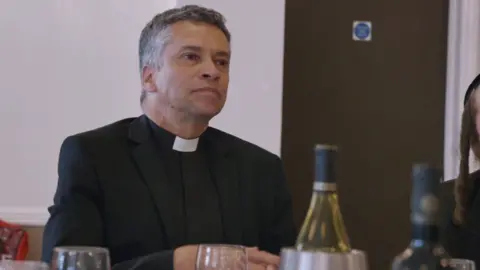Church of England launches review into disgraced priest David Tudor
 Spring Films/BBC
Spring Films/BBCA review of how the case of the disgraced priest David Tudor was handled has been launched, the Church of England says.
Tudor was banned for life from ministry in October 2024 after admitting historical sex abuse allegations relating to two girls.
In December, a BBC File on 4 investigation revealed he had been allowed to stay in post even though senior clergy, including current interim Church leader Archbishop Stephen Cottrell, had been aware of serious safeguarding concerns about him.
The Church's Safeguarding Practice Review (SPR) will not reinvestigate the case against Tudor, but will examine how the Church handled allegations and "how it responded to victims and survivors".
Tudor worked for the Church of England for more than 46 years, in London, Surrey and Essex, rising from curate to honorary canon.
The BBC revealed Tudor had stood trial twice in 1988, in both cases accused of indecent assault against girls under the age of 16.
In the first trial, he was acquitted but had admitted to having sex with one girl when she was 16.
In the other case, he was convicted of indecent assault against three girls, and served a six-month sentence, but the conviction was quashed on the basis that the judge had misdirected the jury.
After serving a five-year suspension, he returned to ministry in the 1990s and was appointed team vicar of Canvey Island, in Essex, in 1997 and team rector in 2000.
Tudor was later suspended in 2005 by the Diocese of Chelmsford after a complaint was made about his conduct relating to a time prior to his ordination in the 1970s.
The BBC is aware of at least seven alleged victims of Tudor's, one of whom received six-figure compensation from the Church in 2019.
Sue Williams, a former commander in the Met Police, has been appointed as an independent reviewer by the Church.
She will be working with an advisory group made up of safeguarding professionals, who will also use the input of victims, the Church said.
Ms Williams will be assisted by former senior police officer Richard Norfolk.
If serious safeguarding concerns relating to the practice of others are highlighted in the review, "appropriate action" will be taken, the Church added.
In February, the General Synod - the Church's governing body - rejected a proposal that would have made safeguarding fully independent, which proponents say would increase accountability but critics say would delay reform.
The review comes at a time of turmoil in the Church of England, following a damning report into how it covered up prolific abuse by the barrister John Smyth.
The report found Smyth had attacked more than 100 boys and young men in the UK and Africa over decades. He never faced justice in the UK or abroad before dying aged 77 in 2018.
The report led to the resignation of the Church's most senior figure, the Archbishop of Canterbury Justin Welby, who stood down last year.
In his first interview since quitting, Justin Welby told the BBC that he forgave the serial abuser, but said it was more important for victims to be "cared for... liberated to rebuild their lives" than to speak about forgiveness.
The Archbishop of York, Stephen Cottrell, has also faced calls from alleged abuse victims to resign after the BBC's File on 4 investigation revealed he had allowed Tudor to remain in post despite knowing his past, that he had been barred from being alone with children and that he had paid thousands of pounds to an alleged sexual abuse victim.
Archbishop Cottrell says that while he "regrets" that under him David Tudor was twice reappointed to a senior role, the risks posed by the priest were regularly under review.
